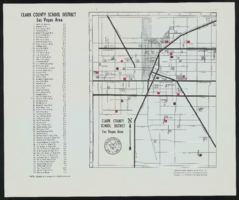Search the Special Collections and Archives Portal
Search Results
Audio clip from interview with Lynn Leshgold Rosencrantz by Barbara Tabach, January 7, 2016
Date
Archival Collection
Description
Part of an interview with Lynn Leshgold Rosencrantz on January 7, 2016. In this clip, Rosencrantz discusses relocating to Las Vegas and teaching education.
Sound

Transcript of interview with Harvey N. Dondero by Elizabeth N. Patrick, August 9, 1984
Date
Archival Collection
Description
Text

Mabel Hoggard: teaching materials
Date
Archival Collection
Description
Folder of materials from the Mabel Hoggard Papers (MS-00565) -- Educational work and legacy file. This folder includes teaching contracts, a Clark County School District Las Vegas Area map, teacher-student guidelines, newsletters, a conference booklet, a speech transcript, and other documents related to Mabel Hoggard's teaching career.
Mixed Content
Nevada-related trade magazines and publications: includes Las Vegas City Magazine, Las Vegas Israelite, Sagebrush, Forester, New American, Public Gaming, Casino Gaming, Elks Magazine, KNPR (Nevada Public Radio) newsletter, Nevada Historical Society Newsletter, Mobile Home News, Nevada Mining, and Nevada Builders’ Association, as well as other magazines and newspapers on topics such as education, Nevada business, and agriculture, 1986
Level of Description
Archival Collection
Collection Name: John Vergiels Political Papers
Box/Folder: Box 010 (Restrictions apply), Box 011 (Restrictions apply), Box 012 (Restrictions apply)
Archival Component
#72026: Graduate College Dean Kate Korgan is the president of the Western Association of Graduate Schools (WAGS) this year. During the annual conference (March 18-21) the panel discussion will include Leonard Cassuto, professor of American literature at Fordham University and author of The Graduate School Mess, and Julie Posselt, professor of higher education at USC and author of "Inside Graduate Admissions: Merit, Diversity, and Faculty Gatekeeping", 2018 March 19
Level of Description
Archival Collection
Collection Name: University of Nevada, Las Vegas Creative Services Records (2010s)
Box/Folder: Digital File 01
Archival Component
Audio clip from interview with Melody Stein, August 16, 2016
Date
Archival Collection
Description
In this clip, Melody Stein speaks about working in a new educational facility and the mural her students painted.
Sound

Transcript from interview with Sari and Paul Aizley by Barbara Tabach, November-December, 2015
Date
Archival Collection
Description
Paul and Sari Aizley discuss their many accomplishments as residents of Las Vegas, including those in education and with Jewish Family Service Agency.
Text

Transcript of interview with Robert Foster by Kelley Tuchman, March 2, 1978
Date
Archival Collection
Description
Text
NSHE Series Records
Identifier
Abstract
Records are from the Nevada System of Higher Education and date from 1952 to 2010.
Archival Collection

Juliana Urtubey oral history interview: transcript
Date
Archival Collection
Description
Oral history interview with Juliana Urtubey conducted by Nathalie Martinez and Barbara Tabach on May 24, 2021 for the Latinx Voices of Southern Nevada Oral History Project. Born in Colombia, Julia was able to immigrate with her family to the United States when she was six years old. The family lived in Chicago, Illinois and later in Phoenix, Arizona. Juliana moved to Las Vegas in 2013 and taught learners with special education needs at the elementary level. In 2021, she was named the National Teacher of the Year, the first Latina and the only Nevadan to ever hold the distinction. Juliana personally received the award from Dr. Jill Biden. Subjects discussed include: Colombia, Chicago, Illinois, National Teacher of the Year, and bilingual education.
Text
